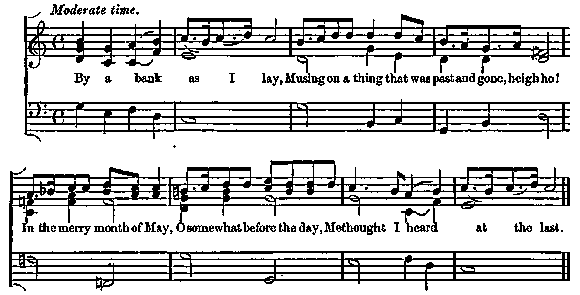Popular Music Of The Olden Time Vol 1
Ancient Songs, Ballads, & Dance Tunes, Sheet Music & Lyrics - online book
| Share page | Visit Us On FB |
|
FROM HENRY VII. TO MARY. 93 |
||||
|
same, but the second differs; and the music to it is not of the light and popular class called Freemen's Songs, hut a studied composition. The words of the latter have been printed by Mr. Payne Collier, in his Extracts from the Registers of the Stationers' Company, vol. i., page 193. They are in the same metre, and therefore might also be sung to this tune.
The last line of the song, as printed in Deuteromelia, is "And save noble James our king," because the book was printed in his reign. - |
||||
|
|
||||
 |
||||
|
|
||||
|
O the gentle nightingale, The lady and the mistress of all musick,
She sits down ever in the dale ;
Singing with her notes smale [small], And quavering them wonderfully thick. |
Oh, for joy, my spirits were quick, To hear the bird how merrily she could sing, And I said, good Lord, defend England, with thy most holy hand, And save noble ' Henry' our king. |
|||
|
ROGEEO.
This tune is to be found among Dowland's Manuscripts,0 in the public library, Cambridge; in William Ballet's Lute Book, and in Dallis' Lute Book, both in the library of Trinity College, Dublin.
The first entry in Mr. Payne Collier's Extracts from the Registers of the Stationers' Company, is to William Pickering, a "Ballett called Arise and wake" (1557). In the Roxburghe Collection of Ballads, there is one commencing, " Arise and awake," entitled—
" A godly and Christian A.B.C., Shewing the duty of every degree," to the tune of Mogero. It may be the ballad referred to, although the copy in the Roxburghe Collection was printed at a later date. In the same year, 1557, there is an entry of " A Ballett of the A.B.C. of a Priest, called Hugh Stourmy," and another of " The aged man's A.B.C." |
||||
|
* The references to these Manuscripts are, D. d. 2. 11. —D. d. 3. 18.—D. d. .4. 23.—D. d. 9. 33.—D. d. 14. 24., &c. Some appear to be in the handwriting of Dowland, |
the celebrated lutenist of Elizabeth's reign. Rogero is in three or four of them. |
The tune of |
||